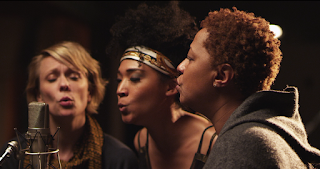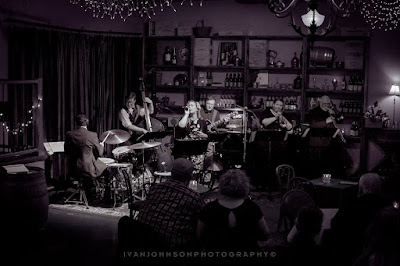Singers Unite! (Singers/Vocalists as Musicians)
There is a pervasive prejudice in the greater musical community that I feel the need to address. It's not a racial thing or a sexist thing (although those definitely exist in the music community as everywhere, and they do tend to amplify the problem) but since we, as musicians, are a comparatively small group in the larger scheme of things, it doesn't get much publicity. But I've seen it continue unchecked throughout my entire career, and no one seems to be calling it out, so I will.
I've heard it in no uncertain terms from many musicians who I (up until they said it) respected. I've seen (and been hurt by) the effects of it, in situations where I didn't get a job or a performance opportunity that I was uniquely qualified for, or in musical activities where I was actively or passively discouraged from participating. As with many prejudiced beliefs, this one tends to blame the "victim" and claim that "if "they" would only do (whatever) we wouldn't feel this way." It produces a situation where, to paraphrase a feminist slogan attributed to Charlotte Whitton, "We have to do twice as well to be considered half as good."
Here's the gist of the belief I rail against:
Singers are not musicians.
So first of all, I'm one of those "word nerds" and one flaw in this belief is simply etymological. A musician is someone who makes music. Period. Therefore, a singer is, by virtue of making music, a musician. I might even make the argument that singers are also instrumentalists; the voice is the first (and arguably the most versatile) of musical instruments, but let's assume, for the purposes of this discussion, that we can make a distinction between musicians and instrumental musicians, and that singers do not fall into the latter category.
So is this just a question of an inappropriately chosen word? Am I overreacting because the people who say that "a singer is not a musician" actually mean "a singer is not an instrumentalist," and I shouldn't read any more into it than that? Or is this just the backpedalling position of someone who's been caught out in much the same way that people claimed to be "not homophobic" because they believed gay people should be allowed "civil unions" as long as they weren't called "marriage"? Obviously, I lean toward the latter theory.
Reasons for the belief (and arguments against them).
Singers usually don't read music, and musicians do.
There certainly do seem to be more singers who don't read music than there are other musicians with the same "handicap". And I will admit to being frustrated when I take over a singing student from another teacher and realize that in however many years of lessons they've had up to this point, they've only ever learned by ear and using lyric sheets from the internet. So if the ability to read music is the essential criterion for being a musician, I guess they don't qualify.
However, using that argument, neither do Dave Grohl, Eric Clapton, Eddie Van Halen, John Lennon, Paul McCartney, Jimi Hendrix, Stevie Ray Vaughn or Danny Elfman. So... there's that.
Singers can't just play any song with any group.
I'd argue that neither can most other musicians, but that's over-simplifying matters. This one breaks down a few ways:
- Singers can't "take solos" the way an instrumentalist does
- "I mean, except for Ella" - So the only singer in history that qualifies as able to improvise is the very best scat singer who ever lived? Imagine if that applied to every instrument!
- It's true that vocalists are usually not quite as comfortable taking solos as instrumentalists. But we are usually neither taught to do so nor encouraged to do so. Even in jazz schools, where we are taught some of the basics of vocal improvising, when it comes to performances, the vocalist usually sings the "head in" and then is expected to step aside and let the instrumentalists take the solos before they are allowed to sing the "head out." If we aren't given opportunities to solo, how can we get better at it?
- In any non-jazz context, a vocalist will be seen as strange if they try to take a solo. Only instrumentalists are permitted to do that, apparently, but the vocalist is still judged negatively because they don't.
- Singers only sing "their songs," so they can't jump into a new group
- Singers have the combined blessing and curse of having to sing lyrics (see above for why that might be). So, in your average blues song, say, an instrumentalist has to learn 12 measures of chords, an intro and an ending. They will probably also get to improvise a solo over that same 12 measure form. The singer, though, needs to learn at least three or four different sets of lyrics, slightly different melodies and rhythms per song. The singer also, often, needs to learn the rest of the parts well enough to cue any stops or shots, bring the band back out of the solo sections and conduct the ending, all with visible gestures, since they're busy singing and can't give verbal cues. So:
- While a more-or-less random sampling of instrumental musicians can probably hash their way through an entire evening of playing, say, 12 blues tunes in a row, (after all, it's the same chords in the same order, often in the same key) if a singer doesn't know all the words to all 12 different blues tunes, they won't be seen as "able to jump in."
- While the comfortable ranges (or keys) for different instruments are largely consistent, that is not the case for vocalists. One vocalist will not necessarily be comfortable in the same keys as another. No one would fault a guitarist for preferring to play in G rather than in A flat, but if your old singer was comfortable in G and your new singer would feel better in A, why is it the automatically singer's job to sing outside of their best key?
Well, this is true, as far as it goes. The reasoning is that since anyone can claim to be a singer, regardless of ability, training, music literacy or musicianship, all singers are immediately suspect. There's an obvious flaw in this logic, since the same suspicion does not apply to instrumentalists.
There are certainly people out there who call themselves singers whose only claim to the title is that they have a voice. On the other hand, there are people who call themselves guitarists whose only claim to the title is that they own a guitar. Or any other instrument. Probably none of those people truly deserve the title of musician, but the instrumentalist will likely be given the benefit of the doubt. The instrumentalist will be assumed to be a competent "musician" until they prove themselves otherwise, while the vocalist will be assumed to be a dilettante unless they can prove themselves "worthy" by some esoteric (and subjective) set of criteria.
So why the distinction? Is it financial? Does the fact that one person chose to go out and buy a keyboard, or a bass, or a guitar make them automatically more serious about music than a person who didn't? Is it like wearing clear-glass glasses to make you look smarter? Would carrying an instrument as a prop somehow magically confer competence?
I was recently considering attending a jam session that was described as "singer friendly." (Which is kind of insulting on the face of it, but that's not even the worst part!) On the webpage, there was a link to a PDF: 9 Tips for Singers. I was curious, so I clicked. It was five full pages of the most condescending, passive-aggressive, unfriendly dreck imaginable, calculated to make sure that every vocalist knew that the "musicians" at the jam believed them to be completely incompetent, musically illiterate, and incapable of following, much less leading, a band. It's possible that I might have met some great players there, and since I am a band leader, I might have actually employed some of them... if I had attended. But I didn't, because I didn't want to have to prove myself (yet again) at what was supposed to be a casual, "singer-friendly" jam.
Of course I guess I should have considered myself "lucky" that the jam session in question even allowed singers to participate. I've seen other jam sessions that specifically exclude singers, and at least one that didn't even bother to set up a microphone. (I participated in that one, though... luckily I can be pretty loud!)
All I ask is that I'm given the same level of respect when I walk through the door as any other musician.
And the above factors don't even take into account the fact that a lot of singers who experience this prejudice happen to be women... who often have a difficult time being taken seriously in many businesses, not just the music industry.
I don't know what exactly needs to be done to resolve this issue.
Sure, there are singers out there in the world who aren't good musicians, or capable band leaders, and who don't know the etiquette of jam sessions, recording sessions, rehearsals, or even live performances. The thing is, there are instrumentalists who don't possess these skills either.
There are members of both camps who are completely unaware that they don't have the necessary skills to truly be considered "musicians."
So either all of us (instrumentalists and vocalists alike) should be considered "musicians" until proven otherwise, or none of us should.
I vote for all of us.







Comments
Post a Comment